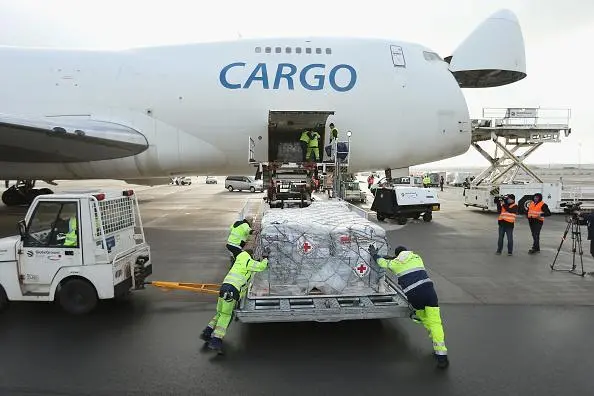PHOTO
Qatar Airways Cargo has launched its first cargo hub outside Qatar, in collaboration with Rwanda’s national airline RwandAir, in a bid to establish strong foundations ahead of an expansion into the African air cargo network and meet the 3-5% annual economic growth forecast for the continent over the next decade.
At 13:00 Central Africa Time on Wednesday, a Qatar Airways Cargo Boeing 777 freighter landed at Kigali International Airport, officially launching operations at the cargo division’s new Kigali Africa Hub.
The Boeing 777 will fly from Doha to Kigali, twice a week. Since March, Qatar Airways Cargo has created an intra-Africa service between Kigali and Lagos (three times per week), and a weekly service from Istanbul via Doha to Kigali, all operated by an Airbus A310 cargo aircraft.
Ahead of the Kigali Cargo Hub launch, QAS Cargo, a subsidiary of Qatar Airways, provided consultancy support to RwandAir Cargo to help advance its cargo handling performance, and improve efficiencies. A team from QAS Cargo visited the cargo handling facilities and presented RwandAir with a detailed action plan for operational improvements and handling performance. The teams say they are now working together on a future roadmap, including a proposed improvement plan for its warehouse infrastructure, which will form part of a long-term strategic plan for the cargo division of RwandAir.
Guillaume Halleux, Chief Officer Cargo at Qatar Airways said: “Africa is one of the world’s fastest growing economies, yet for it to develop to its full potential requires investment in logistics infrastructures. Qatar and Rwanda have long-enjoyed bilateral trade agreements, with both Qatar Airways and Qatar Investment Authority having previously invested in Kigali International Airport and RwandAir. It was therefore a logical step that Qatar Airways Cargo supports RwandAir in its cargo ambitions. Our customers will benefit from both a reliable intra-African network through our Kigali hub, as well as enhanced service levels and cost synergies. We are proud to partner with RwandAir in establishing Kigali as the Central African hub in preparation for the Next Generation of air cargo on this fast-growing continent.”
The cargo airline of Qatar Airways currently serves 28 cities in Africa with a mixture of freighter and belly-hold services, carrying up to 2,800 tonnes to and from Africa.
Middle Eastern carriers experienced a 5.5% year-on-year decrease in cargo volumes in March 2023. This was also an improvement to the previous month’s decline (-7.1%). The demand on Middle East-Europe routes has been trending upward in recent months. Capacity increased 9.7% compared to March 2022.
The International Air Transport Association (IATA) released data for March 2023 global air cargo markets showing a continued decline against previous year’s demand performance. This trend began in March 2022. Global demand, measured in cargo tonne-kilometres, fell 7.7% compared to March 2022 (-8.1% for international operations). This was a slight improvement over the previous February’s performance (-9.4%) and half the rate of annual decline seen in January and December (-16.8% and -15.6% respectively).
At this point, it is unclear if this is a potentially modest start of an improvement trend or the upside of market volatility. Irrespective of this, March performance slipped back into negative territory compared to pre-Covid levels (-8.1%).
Capacity was up 9.9% compared to March 2022, reflecting the addition of belly capacity as the passenger side of the business continues to recover.
IATA note that even with record low unemployment rates, the global economy continues to decelerate due to a combination of factors such as tightening global financial conditions, high levels of global debt, and supply chain problems including those linked to the war in Ukraine. “Air cargo had a volatile first quarter. In March, overall demand slipped back below pre-Covid-19 levels and most of the indicators for the fundamental drivers of air cargo demand are weak or weakening. While the trading environment is tough, there is some good news. Airlines are getting help in managing through the volatility with yields that have remained high and fuel prices that have moderated from exceptionally high levels. Looking ahead, with inflation reducing in G7 countries policy makers are expected to ease economic cooling measures and that would stimulate demand,” said Willie Walsh, IATA’s Director General.
African airlines saw cargo volumes decrease by 6.2% in March 2023 compared to March 2022. This was an improvement in performance compared to the previous month (-7.4%). Notably, Africa to Asia routes experienced significant cargo demand growth in March. Capacity was 4.1% below March 2022 levels.
Air cargo plays a critical role in the economic development of Africa by connecting African businesses to global markets and facilitating trade and commerce.
Last year, Rwanda’s national carrier RwandAir took delivery of a Boeing 737-800 SF, the airline’s first cargo-dedicated aircraft.
Delivered on November 24, 2022, the freighter now operates from the airline’s hub in Kigali and has expanded its cargo operation to destinations in Africa and the Middle East.
At the time of delivery, Yvonne Makolo, CEO of RwandAir, said the new freighter would go on to play a significant role in RwandAir’s operations. “The delivery of our dedicated cargo aircraft is a huge milestone in RwandAir’s fleet expansion plans,” Makolo explained.
“Cargo is of ever-increasing importance for the aviation industry, and as a landlocked country, we recognise the importance and value of good cargo connections,” Makolo added.
RwandAir aims “to ensure that Africa is seamlessly connected to the world, driving economic growth and valuable trade deals,” Makolo said.
The author is an aviation analyst. Twitter handle: @AlexInAir
© Gulf Times Newspaper 2022 Provided by SyndiGate Media Inc. (Syndigate.info).





















